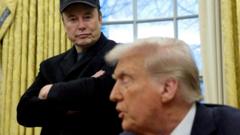Elon Musk has publicly criticized Donald Trump's recently passed tax and spending bill, which he believes undermines fiscal responsibility. This marks a notable divergence from his previous support for Trump during the 2024 election campaign, as Musk suggests the legislation could exacerbate the federal deficit.
Elon Musk Voices Discontent Over Trump's Tax and Spending Legislation

Elon Musk Voices Discontent Over Trump's Tax and Spending Legislation
The tech entrepreneur expresses disappointment in the financial implications of a key policy associated with the former president.
Elon Musk, the CEO of Tesla and SpaceX, has expressed his disappointment regarding a major policy initiative championed by Donald Trump, signaling a potential rift between the tech mogul and the former president. The U.S. House of Representatives recently approved Trump’s "big, beautiful" bill, which promises extensive tax cuts and bolstered defense spending, and is on its way to the Senate for further consideration.
In an interview with CBS News, Musk articulated his concerns, stating, "I was disappointed to see the massive spending bill, frankly." He indicated that he felt the legislation could negatively impact his previous efforts to reduce federal spending—efforts for which he was once appointed as a cost-cutting advisor by Trump, responsible for curtailing various government expenditures, including foreign aid.
Musk particularly assailed the financial underpinnings of Trump's proposal, which could reportedly inflate the national deficit by approximately $600 billion in the coming fiscal year. "It increases the budget deficit, not just decreases it," he argued, referring to the implications of expanding government spending while aiming to retain tax breaks.
The tech leader also undermined Trump's assertion of the bill being both "big and beautiful," suggesting that such a characterization lacks validity. "I think a bill can be big or beautiful. I don't know if it can be both," he quipped during the interview, succinctly capturing a critical perspective on fiscal policy.
Musk's comments have drawn attention to growing ideological divisions within Trump's Republican Party, as not all members agree on the merits of the proposed tax and spending increases. Following the House's narrow approval of the bill, Trump conceded that while he enjoys certain facets of the legislation, such as the proposed tax cuts, there are reservations about other components.
The bill aims to extend tax reductions from the 2017 fiscal policies and proposes an increase in the federal debt ceiling to $4 trillion—essentially allowing the government to borrow more. Musk's stance emerges as he has recently indicated a desire to step back from his advisory role within the Department of Government Efficiency (Doge), which aims to save $1 trillion by reducing the size of government.
While Musk has pledged to reduce his political donations, claiming he's doing "a lot less" in that realm, his earlier support for Trump included contributions exceeding $250 million to assist in the former president's re-election efforts. As the ongoing debate about spending and national debt ensues, Musk’s criticisms reflect a notable shift as the billionaire continues to advocate for what he considers necessary fiscal prudence.



















